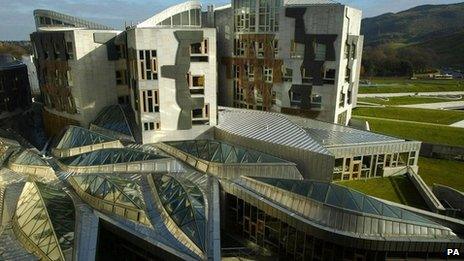Scottish independence: Propose, test, dispose
- Published

Arrangements for the referendum, proposed by the Scottish government and tested by the Electoral Commission, need approved by the Holyrood parliament
Re the referendum, we get the (updated) question tomorrow. But, as a taster, we got questions in the chamber today.
Using the welcome innovation of a topical question, Labour's Patricia Ferguson invited the Scottish government to guarantee, in advance, that they would follow the advice of the Electoral Commission - which will be published tomorrow.
In response, Nicola Sturgeon, the deputy first minister, adopted her best mock-weary voice. (Actually, given how many times she has faced this question, perhaps it was authentic.)
Constitutionally, she explained, it was up to the SG to set out its thinking, it was up to the commission to advise - then it was up to Parliament as a whole to decide. Propose, test, dispose.
That, she said, was how these things always went: at Holyrood, at Westminster, in the Welsh Assembly.
This would be no different. It would, she argued, be an "utter abdication" of the role of ministers in relation to Parliament to agree to the commission's advice without seeing it.
However, Ms Sturgeon offered a little more. She said she attached "considerable weight" to the advice of the commission (which, I feel sure, will be a huge comfort to them.)
Further still, she said there would have to be a "very good reason" to depart from the commission's guidance.
She was talking in general terms although it might be thought that her remarks applied with particular force to the issue of the question to be asked in the referendum.
There is, of course, politics at play here. Ms Sturgeon knows only too well that it would not look good if she were to end up quibbling with the advice of the independent commission, without that "very good reason".
It might look like seeking advantage - and might puzzle some voters.
Ms Ferguson pursued the matter, seeking still further assurance.
To be fair to her, this really matters. The question - and controversial issues such as campaign finance - must be pinned down in order to ensure a fair plebiscite where the outcome is accepted on both sides.
I have heard this described as "process" - as if it were, somehow, secondary and trivial. As if it were thwarting authentic debate.
The reverse is true: untrammelled debate on the issues surrounding independence will not be possible while any doubts remain about the rules.
So where are we going? I think we may take it from Ms Sturgeon's tone that she hopes to be able to say "yes" to the commission.
Indeed, yes/yes in that she hopes to endorse both their suggested question and their suggested rules on matters such as campaign finance.
A possible outcome? The SG's suggested question is: Do you agree that Scotland should be an independent country?
Spending limits
Some say that is too inclusive, too inviting.
Experts commissioned by the opposition parties suggested that there should instead be a preface statement on the ballot paper - "Scotland should become an independent state" - with the option to tick a box marked "I agree" or another marked "I do not agree."
Seems likely that something along those lines - with the alternative agree/disagree options on the ballot paper - will find favour with the commission.
On finance, the SG wanted to limit expenditure during the final 16 weeks of campaigning, the regulated period, below the amounts which might otherwise apply under the Political Parties Elections and Referendums Act 2000. (New rules are needed because PPERA applies to plebiscites called by Westminster.)
The SNP concern was that they could be outspent if there were to be relatively well-funded collective campaigns on both sides - but with only one major party backing a "Yes" vote and three big parties opting to support the Union.
On the Unionist side, they argued that such limits could deprive the public of much needed information in the crucial run-up period while, they alleged, the Scottish government was only obliged to enter purdah in the final 28 days.
Agreement on?
It seems at least feasible that the commission may return the limit for designated campaign teams (Yes Scotland and Better Together) to £1.5m or thereabouts, rather than the £750k suggested by the SG.
But it seems at least feasible that they will base the limits for parties upon their popular support in the 2011 Scottish Parliament elections.
That would mean the SNP could spend most, followed by their three Unionist opponents in descending order, then the Greens.
That might produce an overall outcome rather closer to parity. I stress, might.
Depending on detail - and that matters, of course - it seems possible at the moment that there may be no "good reason" for Ms Sturgeon to dissent. An agreement could be on.
PS: Intriguing developments in the environs of Tannadice. To Peter Houston, best wishes and thanks for the cup and European qualification. Wonder who the new boss will be. Maybe we should have a referendum . . .